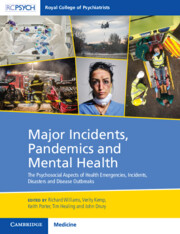 Major Incidents, Pandemics and Mental Health
Major Incidents, Pandemics and Mental Health from Section 4 - Responses to Meet the Mental Health Needs of People Affected by Emergencies, Major Incidents, and Pandemics
Published online by Cambridge University Press: 11 January 2024
This chapter draws together key principles that underpin how the responsible authorities should respond to the psychosocial and mental health needs of the public who are affected. It presents an approach that blends psychosocial care with mental healthcare into a comprehensive and inclusive combined cross-agency approach that combines the prominent biomedical and psychosocial conceptual approaches.
To save this book to your Kindle, first ensure no-reply@cambridge.org is added to your Approved Personal Document E-mail List under your Personal Document Settings on the Manage Your Content and Devices page of your Amazon account. Then enter the ‘name’ part of your Kindle email address below. Find out more about saving to your Kindle.
Note you can select to save to either the @free.kindle.com or @kindle.com variations. ‘@free.kindle.com’ emails are free but can only be saved to your device when it is connected to wi-fi. ‘@kindle.com’ emails can be delivered even when you are not connected to wi-fi, but note that service fees apply.
Find out more about the Kindle Personal Document Service.
To save content items to your account, please confirm that you agree to abide by our usage policies. If this is the first time you use this feature, you will be asked to authorise Cambridge Core to connect with your account. Find out more about saving content to Dropbox.
To save content items to your account, please confirm that you agree to abide by our usage policies. If this is the first time you use this feature, you will be asked to authorise Cambridge Core to connect with your account. Find out more about saving content to Google Drive.